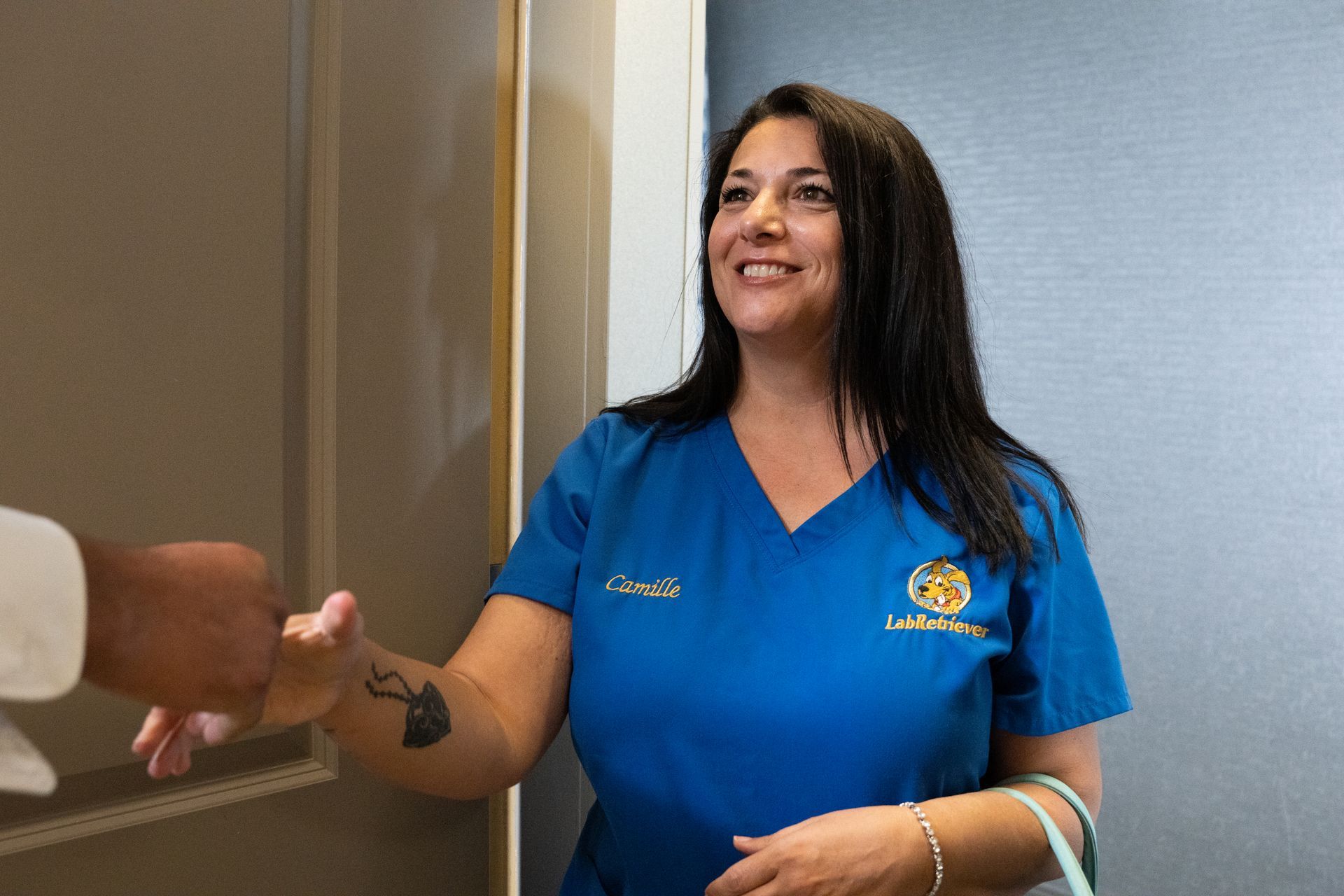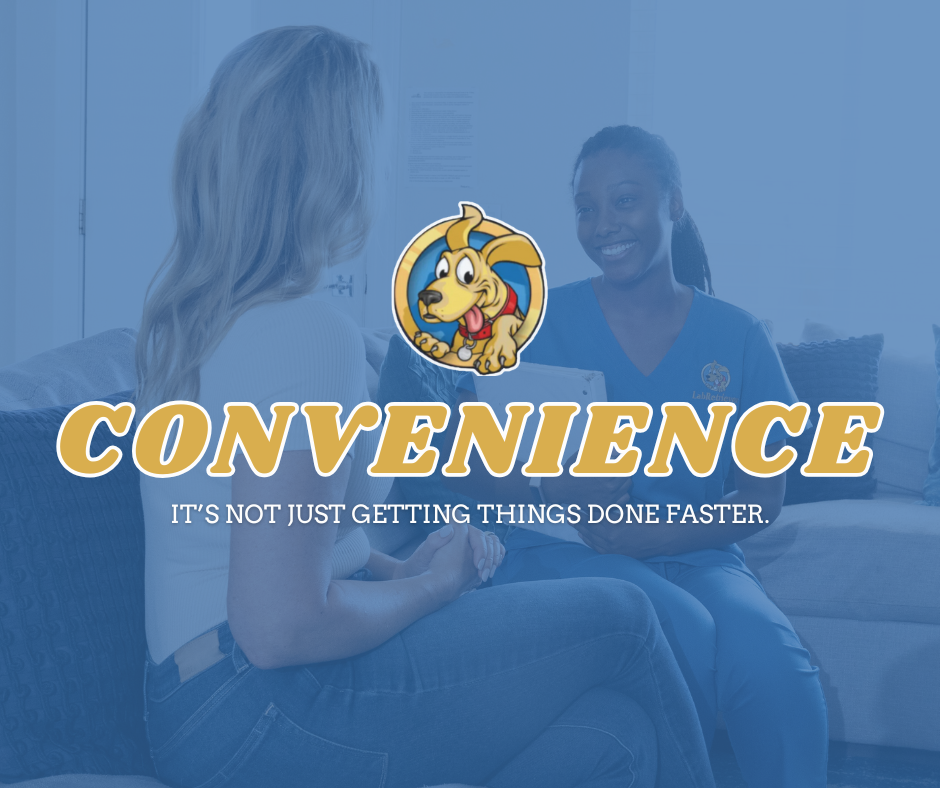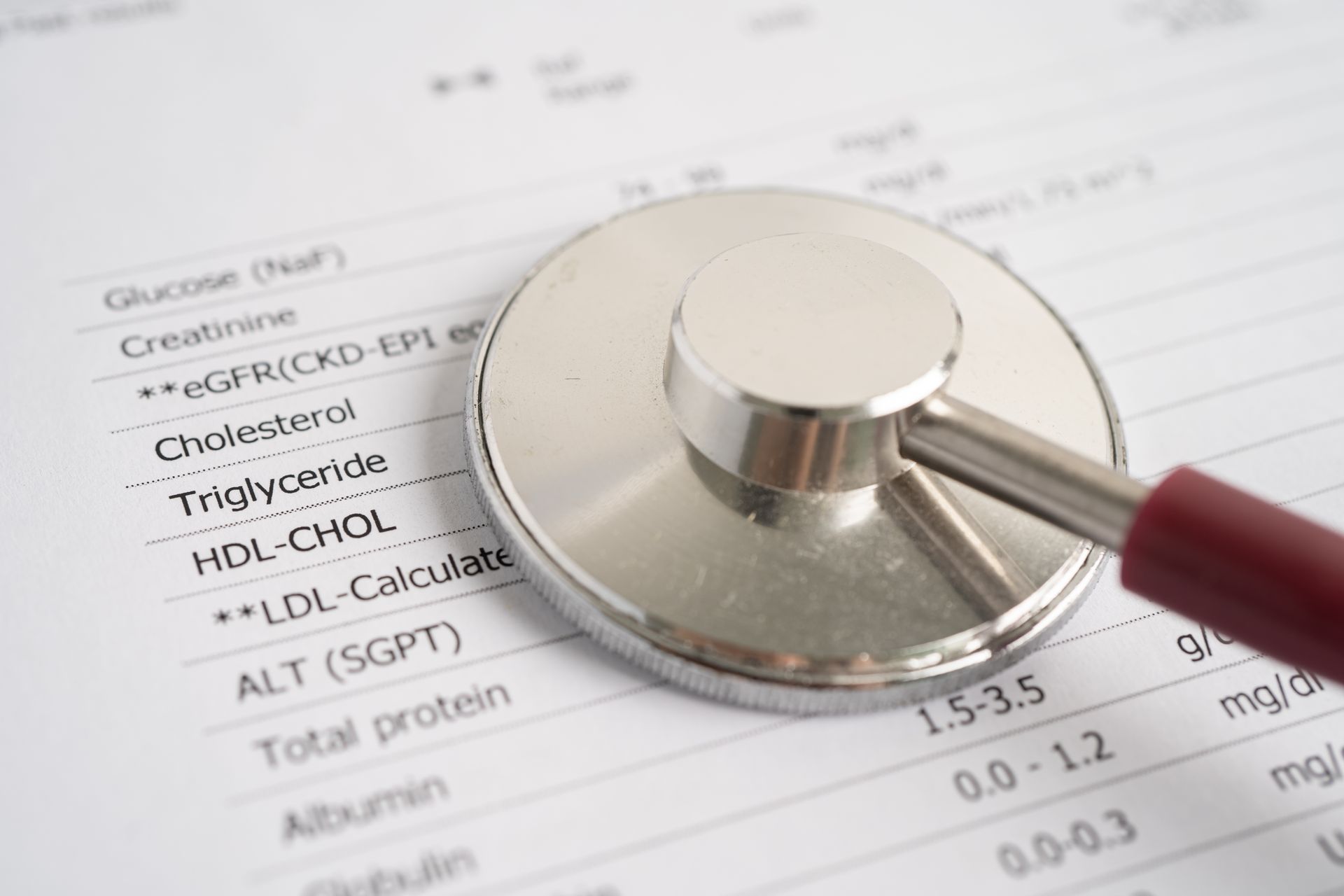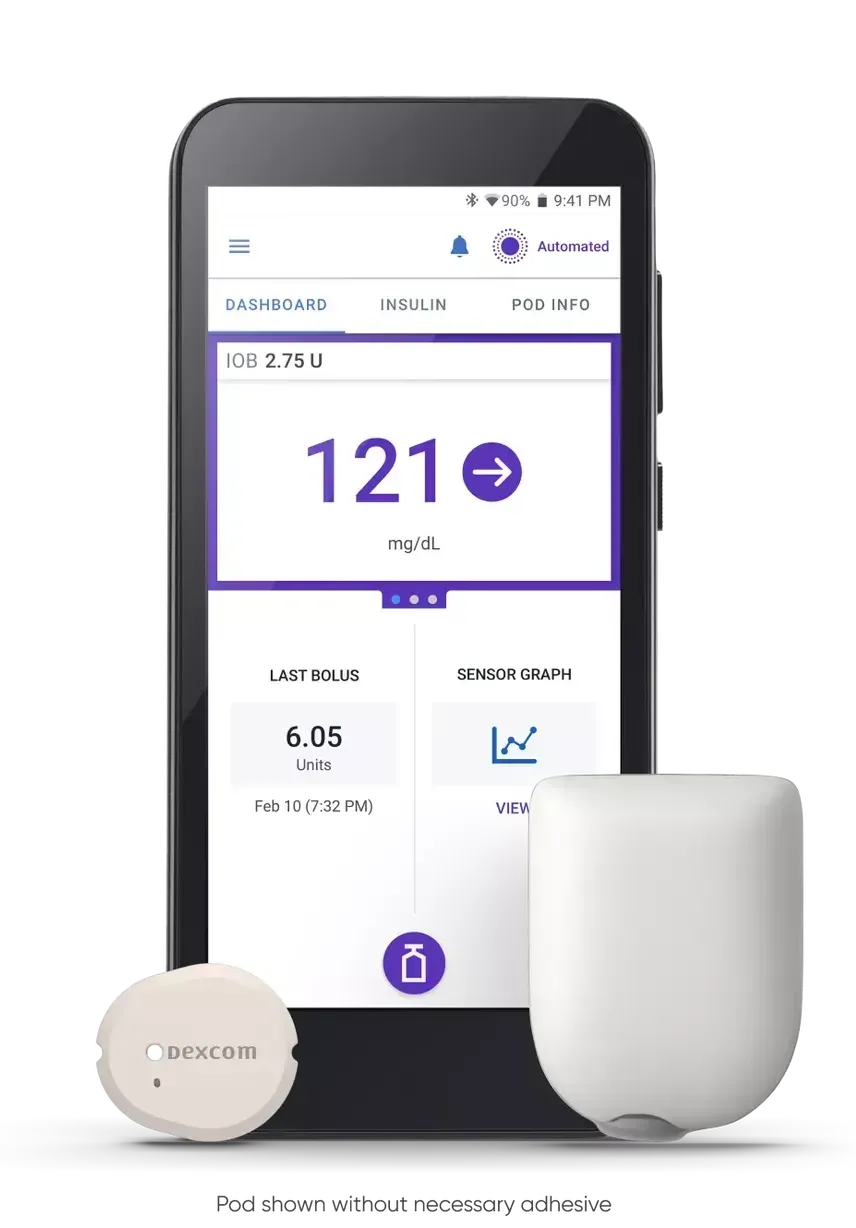Analysis and Diagnosis of Cholesterol and Glucose Levels: Nearby Testing Services
Health concerns like high cholesterol and glucose levels often bring stress, especially if there's a family history involved. However, understanding these vital numbers doesn't have to be daunting or inconvenient. With advances in technology, tools for monitoring your health are now more accessible than ever before. Solutions are available right at home or within a short drive from your location.
Convenience is crucial when it comes to managing your health proactively. Modern options range from simple at-home test kits by reputable brands that you mail off for quick results or you can visit local lab-patient service centers like
LabCorp and
Quest Diagnostics. For convenience and to save time, you might find mobile phlebotomy services like
YourLabRetriever, that can collect your sample at your home and deliver it to the lab on your behalf. Each method is designed to give you rapid insights into your cholesterol and glucose levels without overwhelming your busy schedule or budget constraints.

You can also get cholesterol and glucose screenings at local clinics, hospitals, or diagnostic centers. Contact your healthcare provider or use online directories to find the nearest facility offering these screenings. Monitoring these levels regularly is important for a proactive approach to managing your health.
Mobile Phlebotomy Services for Testing
When it comes to testing our cholesterol and glucose levels, convenience is key. Nobody wants to spend hours driving to a lab, waiting in line, and then waiting even longer for the test results. Thankfully, mobile phlebotomy services have emerged as a game-changer in the world of healthcare. These services bring the lab experience right to your doorstep, saving you time and offering a level of comfort that traditional testing methods simply can't provide.
Imagine this: you're a busy professional with a hectic schedule. Between work meetings, errands, and time spent with loved ones, finding the time to prioritize your health often falls by the wayside. With mobile phlebotomy services, however, you can schedule an appointment at your convenience and have a skilled professional come to your home or office to draw your blood for testing. No need to rearrange your entire day or make long commutes; simply carve out a small window of time for at home blood work and let the experts take care of the rest.
The benefits of mobile phlebotomy services extend beyond convenience. For individuals who have mobility issues or are unable to leave their homes due to health conditions, these services are a lifeline. They ensure that everyone has access to vital medical tests without having to undergo the stress and challenges of traveling to a clinic or hospital. In addition, mobile phlebotomists are highly trained professionals who understand the importance of proper sample collection techniques. They use sterile equipment and follow stringent protocols to ensure accurate results during these in home lab draws. These professionals often build relationships with their clients over time, creating an atmosphere of trust and familiarity that can be comforting during what might otherwise be an uncomfortable experience.
Of course, like any service, there are potential drawbacks to consider when opting for mobile phlebotomy. Some may argue that having someone come to your home for testing may invade your privacy or make you feel uneasy. While these concerns are valid, reputable mobile phlebotomy services prioritize confidentiality and professionalism. They ensure that your personal information remains secure and treat your home with utmost respect. Others may question the reliability of mobile phlebotomy services compared to traditional clinic-based testing. However, it is important to note that mobile phlebotomy professionals are trained to deliver high-quality care and obtain accurate samples.

As long as you choose a reputable service with licensed and experienced phlebotomists, there should be no compromise on the accuracy of your test results. Think of mobile lab services as the equivalent of on-demand food delivery but for healthcare. Just like how you can order food from your favorite restaurant and have it delivered to your doorstep, you can now order blood tests and have a skilled phlebotomist come to you. It's a convenience that modern technology has made possible, revolutionizing the way we approach healthcare and putting our health back in our own hands.
Whether you're a busy professional, an individual with mobility challenges, or simply value the comfort and convenience of at-home testing, mobile phlebotomy services offer a promising solution. With their expert care, professionalism, and dedication to privacy, these services provide an efficient option for keeping tabs on our cholesterol and glucose levels without disrupting our daily lives. So why not take advantage of this remarkable innovation in healthcare? Your health deserves it. Now that we understand the benefits of mobile phlebotomy services, let's dive into the importance of understanding screening results and what they mean for our overall health.
Understanding Screening Results
When it comes to your health, numbers can paint a detailed picture. Let's talk about cholesterol levels first. Cholesterol tests measure three key components: LDL (bad cholesterol), HDL (good cholesterol), and total cholesterol. Here's what these numbers should ideally look like:
- LDL: Optimal levels are less than 100 mg/dL.
- HDL: Optimal levels are 60 mg/dL or higher.
- Total Cholesterol: Should be less than 200 mg/dL.
So, when you receive the results of your cholesterol test, keep an eye on these values. If your LDL or total cholesterol levels are high, this could indicate an increased risk for cardiovascular diseases. On the other hand, if your HDL levels are high, it tends to be protective and lowers the risk of heart disease.
Now, let's move on to understanding blood glucose levels. These are typically assessed through fasting blood sugar tests or A1C tests:
- Fasting Blood Sugar: The normal range is 70-99 mg/dL.
- A1C Test: Reflects average blood glucose over 3 months; normal is below 5.7%.
You need to know that these numbers give us guidance on our risk for conditions such as diabetes and cardiovascular diseases.
If your fasting blood sugar levels are consistently above the normal range, it could signal a potential issue with glucose regulation in your body. This may pave the way for diabetes if left unaddressed. Think of it this way: If your body were a house, the cholesterol and glucose tests would be like checking the foundation and walls for any damage or weakness. It lets you know what work needs to be done before a major issue arises. By understanding our test results, we're better equipped to monitor and address potential health risks. Now, let's explore how we can proactively manage these risks in our everyday lives.
Health Risks and Monitoring
When your LDL cholesterol or blood glucose levels are too high, it's not just a number on a piece of paper. It means that you're at risk for some serious health problems. Elevated levels of LDL cholesterol can lead to plaque buildup in your arteries, increasing the risk of heart disease. Unchecked problems with glucose regulation can pave the way to Type 2 diabetes.
Where health is concerned, knowledge truly is power. Staying on top of your cholesterol and glucose levels can help you avoid these health risks. Monitoring your cholesterol every 4-6 years, especially for those at risk of cardiovascular issues, gives you a window to address any worrisome trends before they become a problem. Similarly, keeping an eye on glucose levels annually is important for those at risk of developing prediabetes or diabetes. Given the stakes, early detection makes all the difference. This proactive approach not only gives you a heads-up about immediate areas of concern but also helps you track long-term trends—essentially empowering you with the knowledge to make informed decisions about your health.
Monitoring your cholesterol and glucose levels doesn't have to be a guessing game. With advancements in technology, there are tools available that make regular monitoring convenient and efficient, such as continuous glucose monitors (CGMs) like the Dexcom G6. These wearable devices provide real-time tracking of glucose levels and offer immediate alerts when levels are irregular. This kind of continuous feedback arms you with valuable insights into how your body responds to different activities and foods, helping you identify patterns that may impact your overall health.
Imagine knowing exactly how your body reacts after a meal, during exercise, or in response to stress—all without having to make frequent trips to the doctor's office. This real-time data empowers individuals to actively manage their health and make necessary adjustments to their lifestyle - whether it's fine-tuning their diet or modifying their exercise routine. It offers a level of personalized insight that puts control back into the hands of individuals in managing their health journey.
By understanding these associated health risks and embracing regular monitoring using advanced tools and techniques, individuals can take charge of proactively managing their cholesterol and glucose levels, significantly reducing the potential risks associated with elevated levels.
Embracing proactive measures for health doesn't just stop at monitoring; it also involves leveraging expert medical insights to make informed decisions about our well-being.
Expert Medical Insights
When it comes to understanding and managing cholesterol and glucose levels, seeking professional expertise can make a world of difference in achieving optimal health outcomes. Let's explore the insights provided by endocrinologists, dieticians, and medical studies to gain a comprehensive understanding of how these experts can help guide us toward better health.
Consult Endocrinologists
Endocrinologists are specialists in the endocrine system, which plays a critical role in regulating various bodily functions. These specialists, like Dr. Ananda Basu, emphasize the significance of maintaining glucose and cholesterol within normal ranges to significantly lower health risks. They offer tailored advice based on individual health profiles, taking into account factors such as age, gender, lifestyle, and existing medical conditions. Their specialized knowledge enables them to develop personalized plans to effectively manage cholesterol and glucose levels, thereby mitigating the risk of associated health issues.
Dieticians' Input
Registered Dieticians hold a wealth of knowledge about nutrition and its impact on overall health. Professionals like Joy Bauer often recommend dietary changes to manage cholesterol and glucose levels effectively. High-fiber foods, omega-3 fatty acids, and reduced sugar intake are commonly recommended dietary adjustments aimed at regulating these vital health markers. Dieticians play a crucial role in educating individuals about making informed food choices that support cardiovascular health and blood sugar management.
Medical Studies
Medical studies serve as valuable sources of evidence-based information regarding cholesterol and glucose management. According to a study published in the Journal of the American Medical Association (JAMA), individuals who consistently monitor and manage their cholesterol and glucose levels reduce the risk of heart disease by up to 30%. These findings underscore the pivotal role of proactive management in improving cardiovascular health and overall well-being. Such studies provide essential insights that not only validate the importance of regular monitoring but also guide healthcare professionals and individuals in making informed decisions about their health.
By drawing upon the expertise of endocrinologists, and dieticians, and the findings from medical studies, individuals can gain comprehensive knowledge and guidance for effectively managing their cholesterol and glucose levels. This multifaceted approach ensures that holistic care is provided, ultimately contributing to improved overall health outcomes.
Finding Local Testing Services
When it comes to getting your cholesterol and glucose levels checked, knowing where to go for reliable and accurate testing is crucial. Here are some tips to help you find local testing services.
Order Online Tests Directly
Websites like LabCorp or Quest Diagnostics offer searchable databases of tests and test panels you can order directly. Simply find the test you want and search for nearby mobile lab draw services like YourLabRetriever to visit your home and deliver your sample to the lab you chose. It really is that convenient for you.
Doctor Referrals
Seeking a doctor's referral is a surefire way to find reputable local laboratories and clinics for testing. Primary care physicians can guide you to facilities known for their accuracy and reliability in testing protocols. Their referrals can put your mind at ease, knowing that the blood work results you receive are from trusted sources that follow stringent quality control measures. By utilizing online directories, community health centers, and doctor referrals, you can strategically navigate the landscape of local lab draw services with confidence and convenience. These strategies not only provide accessibility but also ensure that you receive accurate and reliable test results, laying the groundwork for informed decision-making about your health.
Now let's shift our focus toward practical tips for regular testing.
Practical Tips for Regular Testing
When it comes to managing your cholesterol and glucose levels, scheduling routine lab work is essential. Try making a habit of scheduling these tests during your annual physical exams, or set reminders on your calendar to ensure you don't miss your screenings. By integrating these tests into your regular health check-ups, you're actively taking charge of your well-being.
While regular testing is important, it's equally essential to make lifestyle adjustments. Maintaining a balanced diet and incorporating regular exercise into your routine is crucial in keeping cholesterol and glucose levels in check. By doing so, you'll not only keep the test results within healthy limits but also make them more meaningful and actionable for your overall health management.
In addition to scheduling routine tests and adopting a healthier lifestyle, keeping records of all your test results is an insightful practice. Consider using a health app like
MyChart or
Apple Health to log your test results over time. This diligent tracking of metrics will empower you to observe trends and proactively make informed decisions about your health. It’s like having a window into your well-being that enables you to better understand what works for you and what could be improved. For instance, by keeping track of the correlation between your diet, exercise regimen, and the change in your cholesterol and glucose levels over time, you can identify patterns that inform better health choices and the need for possible adjustments.
We firmly believe in providing comprehensive support beyond just the actual testing services. Our website, www.yourlabretriever.com, offers valuable guides and resources aimed at helping you locate nearby testing facilities, understand your test results with clarity, and find expert advice on effectively managing your health. It's our way of ensuring that the process of monitoring and maintaining healthy cholesterol and glucose levels feels less daunting and more manageable for everyone involved.
By incorporating these practical tips into your routine, you'll not only ensure that you stay on top of your cholesterol and glucose levels but also actively contribute to a healthier lifestyle that promotes overall well-being.








In Need of at Home Blood Work? We can help!
Schedule an appointment today! Our skilled professionals will come to your home or office to provide expert lab work.
All Rights Reserved by LabRetriever | Careers | Areas We Service | About Us | Terms & Conditions | Website Developed by Red Tree Marketing







